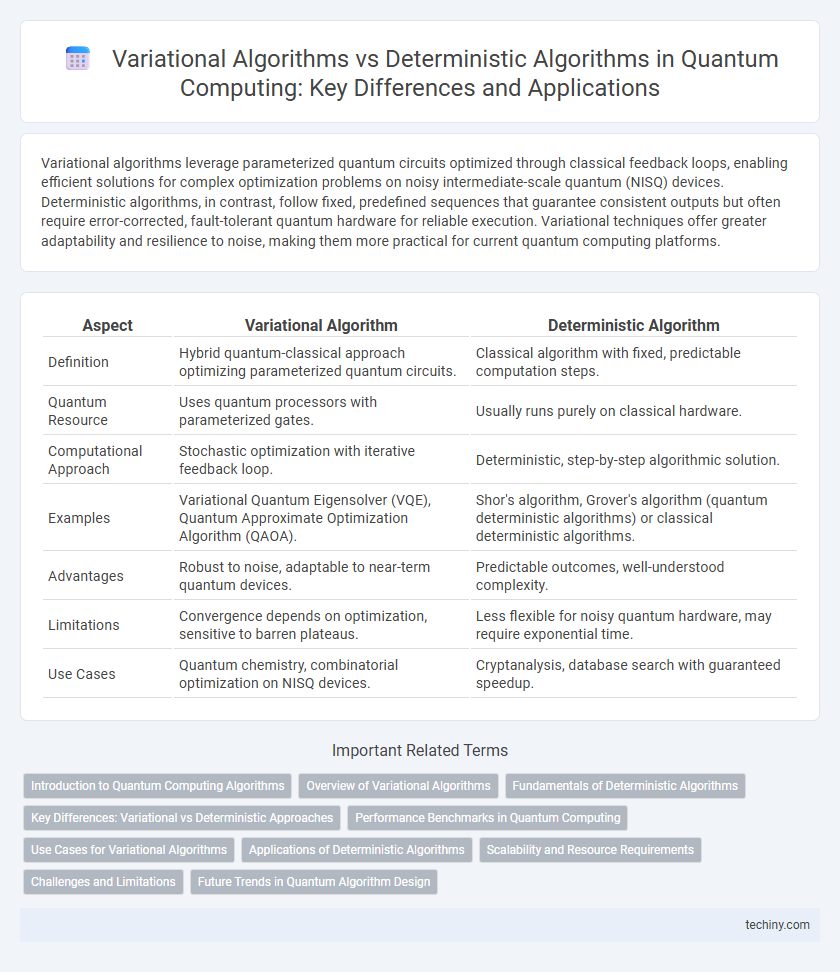Variational algorithms leverage parameterized quantum circuits optimized through classical feedback loops, enabling efficient solutions for complex optimization problems on noisy intermediate-scale quantum (NISQ) devices. Deterministic algorithms, in contrast, follow fixed, predefined sequences that guarantee consistent outputs but often require error-corrected, fault-tolerant quantum hardware for reliable execution. Variational techniques offer greater adaptability and resilience to noise, making them more practical for current quantum computing platforms.
Table of Comparison
| Aspect | Variational Algorithm | Deterministic Algorithm |
|---|---|---|
| Definition | Hybrid quantum-classical approach optimizing parameterized quantum circuits. | Classical algorithm with fixed, predictable computation steps. |
| Quantum Resource | Uses quantum processors with parameterized gates. | Usually runs purely on classical hardware. |
| Computational Approach | Stochastic optimization with iterative feedback loop. | Deterministic, step-by-step algorithmic solution. |
| Examples | Variational Quantum Eigensolver (VQE), Quantum Approximate Optimization Algorithm (QAOA). | Shor's algorithm, Grover's algorithm (quantum deterministic algorithms) or classical deterministic algorithms. |
| Advantages | Robust to noise, adaptable to near-term quantum devices. | Predictable outcomes, well-understood complexity. |
| Limitations | Convergence depends on optimization, sensitive to barren plateaus. | Less flexible for noisy quantum hardware, may require exponential time. |
| Use Cases | Quantum chemistry, combinatorial optimization on NISQ devices. | Cryptanalysis, database search with guaranteed speedup. |
Introduction to Quantum Computing Algorithms
Variational quantum algorithms leverage quantum circuits with parameterized gates optimized through classical feedback loops, enabling efficient solutions to problems like chemistry simulation and optimization. Deterministic quantum algorithms, such as Shor's and Grover's algorithms, follow fixed quantum circuit sequences with predictable outcomes and are designed for specific computational tasks. Variational approaches excel in noisy intermediate-scale quantum (NISQ) devices by mitigating errors, while deterministic algorithms require fault-tolerant quantum hardware to achieve their theoretical speedups.
Overview of Variational Algorithms
Variational algorithms utilize parameterized quantum circuits optimized through classical feedback loops to solve complex problems, making them well-suited for near-term noisy quantum devices. These algorithms, including the Variational Quantum Eigensolver (VQE) and Quantum Approximate Optimization Algorithm (QAOA), balance quantum resource constraints and problem-specific heuristics. By leveraging hybrid quantum-classical frameworks, variational methods enable scalable approaches to quantum chemistry, optimization, and machine learning tasks.
Fundamentals of Deterministic Algorithms
Deterministic algorithms in quantum computing rely on precise, predictable computational steps that produce the same output for a given input, ensuring reproducibility and reliability. These algorithms often leverage fixed quantum circuits and gate sequences to solve specific problems, contrasting with variational algorithms that utilize parameter optimization and probabilistic outcomes. The fundamental strength of deterministic algorithms lies in their ability to provide exact solutions by systematically manipulating quantum states without dependence on classical optimization heuristics.
Key Differences: Variational vs Deterministic Approaches
Variational algorithms leverage parameterized quantum circuits optimized via classical feedback loops to solve problems with reduced circuit depth, making them suitable for near-term quantum devices. Deterministic algorithms follow a fixed sequence of quantum gates without adaptive optimization, offering precise and predictable outputs but often requiring deeper circuits and error correction. The key differences lie in adaptivity, resource requirements, and suitability for current noisy intermediate-scale quantum (NISQ) hardware.
Performance Benchmarks in Quantum Computing
Variational algorithms demonstrate superior resilience to noise and hardware imperfections compared to deterministic algorithms, leading to enhanced performance in current noisy intermediate-scale quantum (NISQ) devices. Benchmark studies reveal that variational methods achieve higher solution accuracy and require fewer quantum resources for optimization tasks, particularly in quantum chemistry and combinatorial optimization problems. Deterministic algorithms excel in fault-tolerant quantum systems with stable coherence times but tend to underperform in NISQ environments due to their sensitivity to error accumulation and longer circuit depths.
Use Cases for Variational Algorithms
Variational algorithms excel in solving optimization problems and simulating quantum systems where deterministic algorithms face exponential complexity. These algorithms are pivotal in quantum chemistry for finding ground state energies and in machine learning for training quantum neural networks. Their adaptability to noisy intermediate-scale quantum (NISQ) devices makes them indispensable for practical applications in finance, material science, and combinatorial optimization tasks.
Applications of Deterministic Algorithms
Deterministic algorithms in quantum computing are extensively applied in cryptographic analysis, error correction, and optimization problems where predictable outcomes are crucial. These algorithms enable precise simulation of quantum systems for material science and drug discovery by providing exact solutions within polynomial time in specific cases. Their reliability and reproducibility make deterministic algorithms essential for tasks requiring guaranteed convergence and verifiable results in quantum machine learning and cybersecurity.
Scalability and Resource Requirements
Variational algorithms in quantum computing offer improved scalability by leveraging parameterized quantum circuits that adapt to problem complexity, requiring fewer qubits and shallower circuit depths compared to deterministic algorithms. Deterministic algorithms, while precise, often demand exponentially increasing resources in terms of qubits and gate operations as problem size grows, limiting their scalability on near-term quantum hardware. Variational methods optimize quantum-classical hybrid frameworks, minimizing resource demands and enabling more efficient solutions for larger-scale quantum problems.
Challenges and Limitations
Variational algorithms in quantum computing face challenges such as susceptibility to noise, barren plateaus during optimization, and limited scalability on current hardware, which hinder reliable convergence to global minima. Deterministic algorithms, while more predictable in output, often demand exponentially growing resources and are constrained by the lack of fault-tolerant quantum processors. Both approaches are limited by qubit coherence times and error rates, impacting practical implementation and accuracy in solving complex problems.
Future Trends in Quantum Algorithm Design
Variational algorithms leverage quantum-classical feedback loops to optimize problem-specific parameters, offering scalability advantages for near-term noisy quantum devices. Deterministic algorithms, such as Shor's and Grover's, provide provable speedups but require fault-tolerant quantum hardware beyond current capabilities. Future trends emphasize hybrid approaches that combine variational methods with deterministic frameworks to balance algorithmic robustness and hardware efficiency in quantum computing development.
variational algorithm vs deterministic algorithm Infographic

 techiny.com
techiny.com